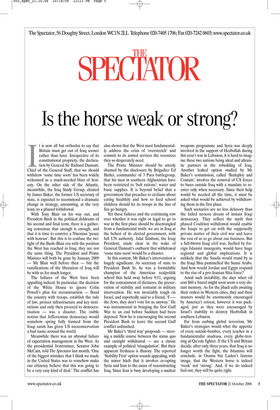Is the horse weak or strong?
It is now all but orthodox to say that Britain must get out of Iraq sooner rather than later. Irrespective of its constitutional propriety, the declaration by General Sir Richard Dannatt, Chief of the General Staff, that we should withdraw ‘some time soon’ has been widely welcomed as a much-needed blast of honesty. On the other side of the Atlantic, meanwhile, the Iraq Study Group, chaired by James Baker, the former US secretary of state, is expected to recommend a dramatic change in strategy, amounting, at the very least, to a phased withdrawal.
With Tony Blair on his way out, and President Bush in the political doldrums of his second and final term, there is a gathering consensus that enough is enough, and that it is time to contrive a Nixonian ‘peace with honour’. But this is to confuse the twilight of the Bush–Blair era with the position the West has reached in Iraq; they are not the same thing. The President and Prime Minister will both be gone by January 2009 — Mr Blair well before then — but the ramifications of the liberation of Iraq will be with us for much longer.
The failures of the West have been appalling indeed. In particular, the decision of the White House to ignore Colin Powell’s plan for reconstruction — flood the country with troops, establish the rule of law, protect infrastructure and key institutions and only then proceed to democratisation — was a disaster. The risible notion that Jeffersonian democracy would somehow spring fully formed from the Iraqi sands has given US neoconservatism a bad name around the world.
Meanwhile there was an abysmal failure of expectation management in the West. As the presidential frontrunner, Senator John McCain, told The Spectator last month, ‘One of the biggest mistakes that I think we made in the United States was to somehow make our citizenry believe that this was going to be a very easy kind of deal.’ The conflict has also shown that the West must fundamentally address the crisis of ‘overstretch’ and commit to its armed services the resources they so desperately need.
The Prime Minister should be utterly shamed by the disclosure by Brigadier Ed Butler, commander of 3 Para battlegroup, that his men in southern Afghanistan have been restricted to ‘belt rations’: water and basic supplies. It is beyond belief that a government that preaches to civilians about eating healthily and how to feed school children should let its troops in the line of fire go hungry.
Yet these failures and the continuing row over whether it was right or legal to go to war in the first place should be disentangled from a fundamental truth: we are in Iraq at the behest of its elected government, with full UN authority. Jalal Talabani, the Iraqi President, made clear in the wake of General Dannatt’s outburst that withdrawal ‘some time soon’ would be a disaster.
In this context, Mr Baker’s intervention is hugely significant. As secretary of state to President Bush Sr, he was a formidable champion of the American realpolitik school that held sway before 9/11, arguing for the containment of dictators, the preservation of stability and restraint in military intervention. He was invariably tough on Israel, and reportedly said to a friend, ‘F—– the Jews, they don’t vote for us anyway.’ He was instrumental in bringing the first Gulf War to an end before Saddam had been deposed. Now he is encouraging the second President Bush to leave the second Gulf conflict unfinished.
Mr Baker’s ‘third way’ proposals — steering a middle course between the status quo and outright withdrawal — are a classic example of political ‘triangulation’. But their apparent freshness is illusory. The reported ‘Stability First’ option sounds appealing, with the minor hitch that it involves co-opting Syria and Iran to the cause of reconstructing Iraq. Since Iran is busy developing a nuclear weapons programme and Syria was deeply involved in the support of Hezbollah during this year’s war in Lebanon, it is hard to imagine these two nations being ideal and altruistic partners in the rebuilding of Iraq. Another leaked option studied by Mr Baker’s commission, called ‘Redeploy and Contain’, involves the removal of US forces to bases outside Iraq with a mandate to reenter only when necessary. Since their help would be needed all the time, it must be asked what would be achieved by withdrawing them in the first place.
Such scenarios are no less delusory than the failed neocon dream of instant Iraqi democracy. They reflect the myth that phased Coalition withdrawal would enable the Iraqis to get on with the supposedly private matter of their civil war and leave the rest of us to go about our business. But a full-blown Iraqi civil war, fuelled by foreign Islamist insurgents, would have huge regional and global implications. It is unlikely that the Saudis would stand by as the Iraqi Shia pummelled the Sunni Arabs. And how would Jordan and Egypt respond to the rise of a pro-Iranian Shia force?
Amid such instability, the days when oil cost $60 a barrel might soon seem a very distant memory. As for the jihadi cells awaiting their orders in Western cities, they and their masters would be enormously encouraged by America’s retreat, however it was packaged, just as they were encouraged by Israel’s inability to destroy Hezbollah in southern Lebanon.
Far from curbing global terrorism, Mr Baker’s strategies would whet the appetite of every suicide-bomber, every teacher in a fundamentalist madrasa, every globe-trotting al-Qa’eda fighter. If the US and Britain decide, after only three years, that Iraq is no longer worth the fight, the Islamists will conclude, in Osama bin Laden’s famous image, that the Western horse is indeed ‘weak’ not ‘strong’. And, if we do indeed bail out, they will be quite right.


































































































 Previous page
Previous page